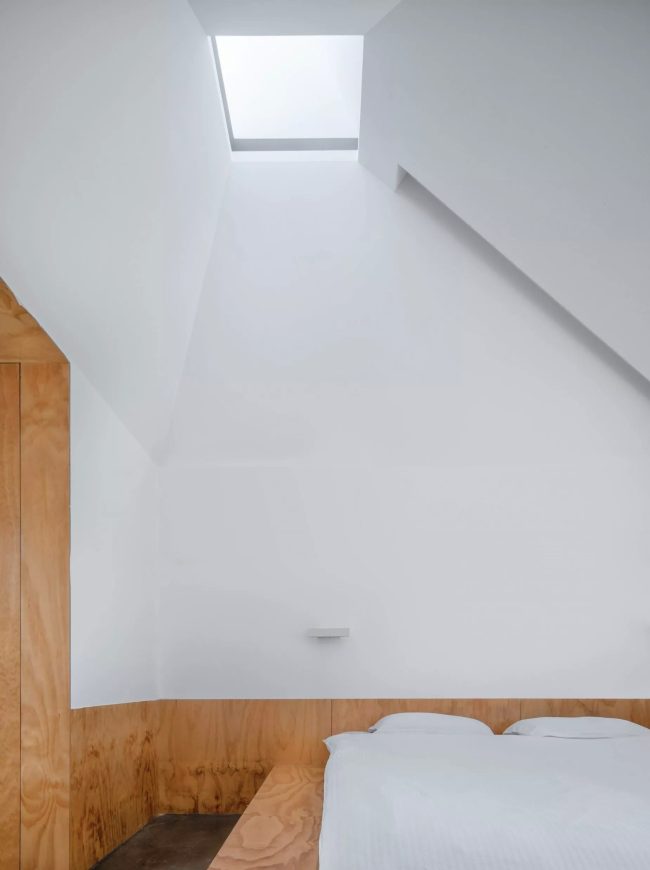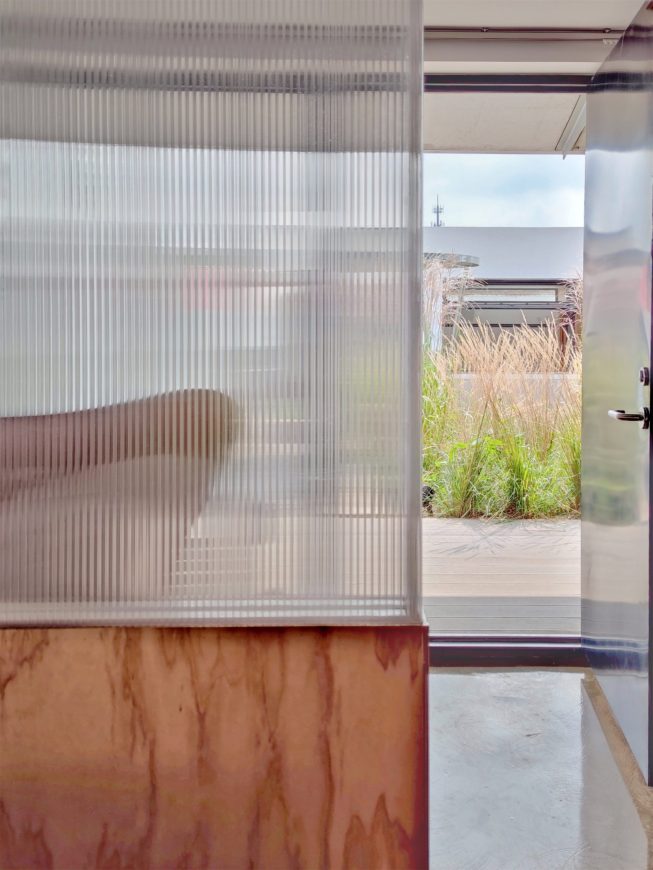本文由 也似建筑 授权mooool发表,欢迎转发,禁止以mooool编辑版本转载。
Thanks YES.ARCH for authorizing the publication of the project on mooool. Text description provided by YES.ARCH.
也似建筑:从天安门出发向西北方向出发八十公里左右,玉渡山面南俯瞰着平坦的延怀盆地。拥挤的、具有华北地区农村典型面貌的晏家堡村就坐落于玉渡山麓之上。它毗邻著名的龙庆峡风景区、世界园艺博览会展场、以及石京龙滑雪场,旅游资源丰富。业主租下村落深处一对兄弟所拥有的两个院落(下文称“南院”与“北院”),希望将它们改造为整院出租的民宿。
YES.ARCH: Being situated at 80 kilometers away northwest of Tiananmen Square, Yudu Mountain overlooks the flat Yanhuai Basin. South-facing Yanjiabu Village sits on the mountain slope, with its crowded fabrics and typical northern Chinese countryside appearance. The village is with great tourism value due to its close distance to popular Longqing Gorge, as well as 2019 Garden Expo sites, and Shijinglong Ski Resort. Two courtyards which are located deep inside the village, are rented by client from twin brothers to be renovated into guesthouses.
▽北院与山 North Courtyard and Mountain

▽北院花园活动用地 North courtyard garden activity site

▽山与院落 Mountain and courtyard

任务书要求建筑师合理地利用院落中现有的建筑提供尽可能多的客房、充分考虑到有限造价下建造的经济性、以及避免改造后的建筑对周邻居的生活产生影响。而作为房主的两兄弟,也有特别的要求:其一,改造必须尊重两处院子的既有产权边界,不能将两处基地打通使用;其二,因风水而不允许更改院落的出入口朝向。
The program book asks architects to reasonably take advantage of courtyards’ existing buildings for more guestrooms, fully consider the economy of construction, and avoid the final results conflicting neighbors’ interests. As the landlords, the twin brothers also have two requirements: first, the renovation must not join the two courtyards into one so to respect existing property boundaries; and second, courtyards’ main entrances’ location should not be changed due to ‘Fengshui’ reasons.
▽北院改造前 Before the renovation of the north courtyard

▽北院改造后 After the renovation of the north courtyard

▽南院改造前 Before the renovation of the south courtyard

▽南院改造后 After the renovation of the south courtyard

我们希望建筑能够为人们观赏山景提供舒适的条件,而非通过制造奇观式的“凸出”物体让自然景色沦为陪衬。这一立场决定了整个院落中的建筑都呈现素色、且建筑节点与做法都尽可能低调。唯一鲜艳夺目的是花园中葱郁茂盛的植物。院子仿佛原本就存在于此,建筑师的工作只是前来做了清理与恢复。
We hope architecture could provide suitable conditions for mountain viewing, rather than submitting nature environment by erecting ‘phallist’ objects. This attitude, therefore, decides buildings’ simple color, and humble architectonic presentation. The only eye-catching elements are gardens’ thrive plants. The project is as if lost and being discovered again. The only job architect carry is to clean and restore.
▽方案生成演示 Scenario Generation Demo

▽设计分析图 Design Analysis Diagram

▽总平面图 General layout

▽平面图 Plan

▽种植植物列表 Planting Plant List

我们在每个院落的南侧置入一个朝北的“亭子”,作为起居室、以及整个院落的公共活动“锚点”。它不仅拥有北方壮丽的玉渡山景色,当折叠玻璃门扇完全打开时,“亭子”的室内空间更融入院落,穿过院落的风和阳光也毫无阻拦的进入室内。天气晴朗的时候,人们亦可登上南院“亭子”的屋顶,向南远眺延怀盆地的开阔景致。院子四周大多数墙体都被白色质感涂料覆盖。这一该地区被人们广泛使用的外墙材料让新建筑成功地隐蔽起来。
We implant a north-facing ‘gloriette’ in each site as both living room and ‘anchor’ for collective activities. With its spectacular view of Yudu Mountain, the gloriette merges itself into the garden when its folding door fully opened, while allowing breeze and sunlight in. In sunny days, people can climb up to south gloriette’s roof for panorama of the basin at south. White stucco paint covers most building surfaces, which helps the new courtyard blending among neighboring houses that are all use this same material.
▽南院正门 The main entrance of the South Courtyard



▽南院嬉水池 Nanyuan Leisure Pool

▽南院起居室入口 South courtyard living room entrance

▽南院起居室 South courtyard living room

▽南院起居室景色 South courtyard living room view

▽南院起居室通向屋顶的台阶 The steps leading to the roof from the living room in the south courtyard

▽南院屋顶平台 South courtyard roof platform

▽南院正房与山 The main house and the mountain in the south courtyard

▽南院正房舒展的屋面 The stretched roof of the main room of the South Courtyard

两个院子看似相同,却有着截然不同的布局。南院的活动——包括嬉水池、露天影院、一个拥有半户外吧台的聚会区——都围绕坐落于正中的亭子而散布在院落之内,被大小各异的、种满高草的圆形种植池所包围。与之相反,北院的“亭子”以及其他活动区域则反过来包围着一个集中的花池。南北院使用上的“反转”使看起来相同的孪生院子产生了富有趣味的差异,也希望催生不同的院落使用方式。而郁郁葱葱、野性、随着季节枯荣的植物和富有活力的户外活动,为两个院子起居室“永恒”的山景提供了别样的前景。
The two gardens are fundamentally different although with somewhat resemble style. All activity spaces in south garden- includes a pool, an open cinema, and a meeting place with a semi-outdoor bar- are spreading across the site circling the gloriette, being surrounded by various sizes’ circular plant pools with high grass. As a mirroring image, activities in north garden are surrounding a centralized plant pools in the middle of the garden. This reverse strategy is hoped to differentiate two sites and provoke imaginative ways of using these outdoor spaces. The thriving, wild and vicissitude of plants, as well as energetic outdoor events, are merged as a colorful foreground for the ‘everlasting’ mountain scenery of both living rooms.
▽北院方案效果图 Rendering of the North Campus


▽北院夜景 North courtyard night view

▽北院花园 North courtyard garden

▽北院起居室 North courtyard living room

▽北院起居室景色 North courtyard living room view

▽北院边亭 North courtyard side pavilion

▽北院客房景色 North courtyard room view

院落坐北的砖木结构正房因为经济原因被保留下来,但其南立面需要进行改造以适应建筑内部的变动。为了最大限度的不对原有建筑的结构造成破坏,我们拆除了南立面上的非承重构造、并浇筑了一堵与原有房屋结构脱离的混凝土剪力墙。这个简单的动作达成了三个目的:其一,剪力墙赋予了建筑以自由的立面;其二,剪力墙支撑起一个两米多的深远挑檐,延展了原有建筑的屋面,形成一个花园与客房之间的“灰空间”;其三,混凝土粗粝的质感与远方的山脉相映成趣,并与其他白色的墙面形成反差、成为院落中的视觉焦点。挑檐与门廊组成的这个三维立面在视觉上压低了正房原本高大的南立面,使之退后到阴影之中,谦逊地成为壮丽山景的注脚。
The wood-brick structure main houses in both gardens, which are kept for economical reasons, need to modify their south façade reflecting building’s interior changes. A free-standing concrete sheer wall is erected to avoid damage on existing structure. This installation achieves three purposes: one, it gives the building a free façade; two, it supports a two meters’ deep eaves, extending existing roof to form a ‘grey space’ between garden and rooms; last, concrete’s coarse texture echoes mountain’s rough rocky landscape, contrasting other surfaces’ whiteness. The house’s tall south elevation is suppressed by this three dimensional façade, recessing into shadow as footnote for the spectacular mountain view.
▽院落改造剖透视 Cutaway Perspective of Courtyard Reconstruction

▽北院正房门廊 North courtyard main house porch

▽南院正房门廊 South courtyard main room porch

考虑到原有房屋较大的进深,我们在客房内除了设置基本的盥洗和睡眠区域外,还增加了一处“修室”。与物尽其用地利用原有房屋结构营造高大室内的睡眠区不同,修室是一个狭小、与人体更为亲近的空间。通过尺寸各异的窗户,修室得以挑战人体与窗外院落景致不同的关系。同时,它也充当了强调隐私的客房与院落生活的缓冲。
Thanks to the deepness of the original house, we are able to place a ‘monastic cell’ inside each guestroom besides lavatory unit and sleeping unit. Unlike the sleeping unit which tries to maximize its height by exploiting the existing structure, the monastic cell is a small, intimate space. It challenges the relationship between human body and landscape outside through windows of various sizes. It is also a buffer zone for privacy-centric bedroom against the lively courtyard life.
▽客房方案效果图 Room plan renderings

▽客房 Guest room

▽卧床与修室由半透明的隔断分开 The bed and the study room are separated by a translucent partition

▽材料与光线的互动 Interaction of material and light
设计单位:也似建筑
公司网址:https://www.yesarch.cn/
项目名称:大山十吉民宿改造
设计主题:孪生院子
主持建筑师: 罗韧、赵耀
设计团队:王楠、黄雨竹、张春栋、郑嘉威
用地面积:825㎡
建筑面积:323.39㎡
设计时间:2019年9 月
项目地点:北京延庆
项目状态:已建成
摄影:©朱雨蒙
邮箱:office@yesarch.cn
Architect: YES.ARCH
Company website:https://www.yesarch.cn/
Project Name: Renovation Of The Da Shan Shi Ji’s House
Design Motif: Twin Gardens
Principals In Charge: Luo Ren、Zhao Yao
Design Team: Wang Nan、Huang Yuzhu、Zhang Chundong、Zheng Jiawei
Site Area:825㎡
Floor Area: 323.39㎡
Year: 2019.9
Project location:Beijing yanqing
Status: Completed
Photography: ©Zhu Yumeng
Email:office@yesarch.cn
“ 自然野奢的庭院景观与远方山石的景色相互映衬。”
审稿编辑: Maggie
更多 Read more about: 也似建筑 YES.ARCH






0 Comments